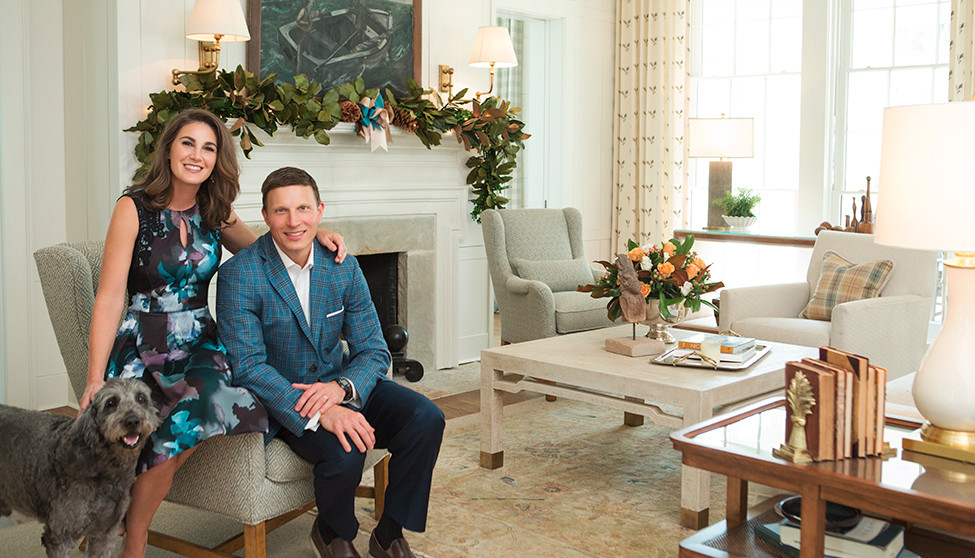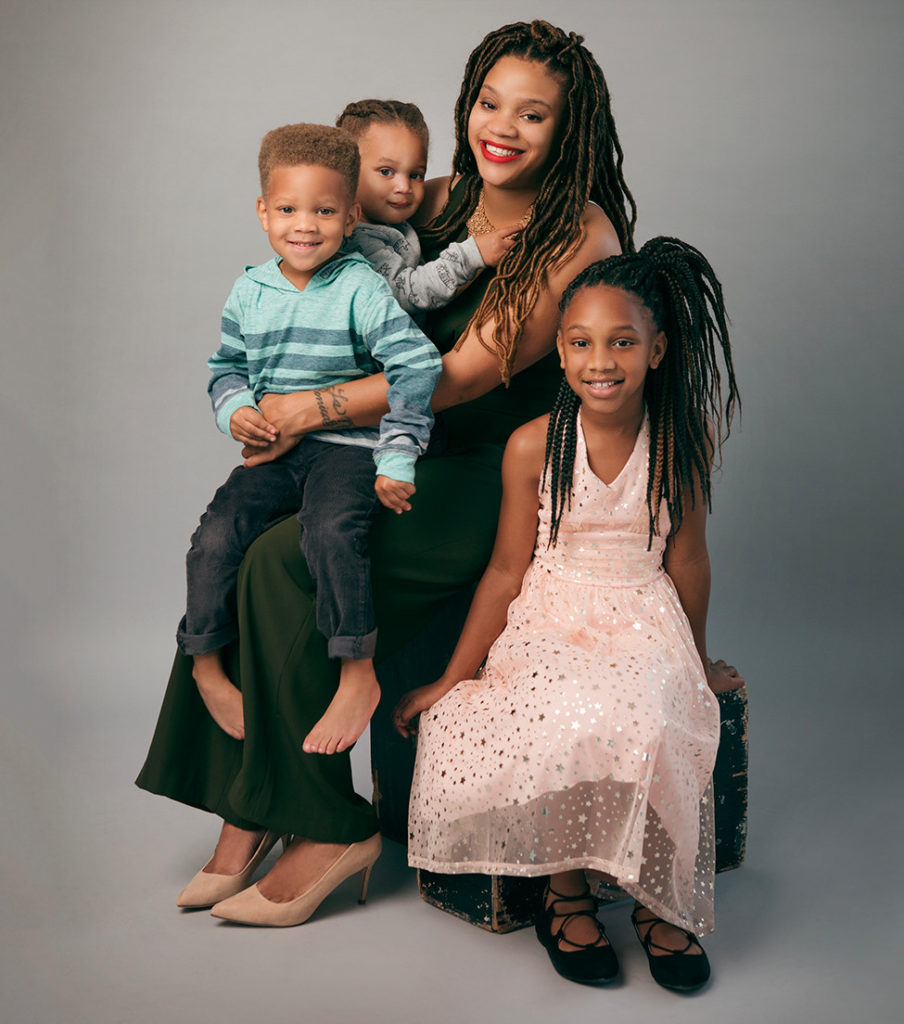Click here to read Little Rock Soirée’s article!
Little Rock Soirée
November 1, 2017
By Dwain Hebda
Photos by Jason Masters
As long as she can remember, Sharonica Lee has known the icy grip of poverty, how it suffocates people under the garbage hours and minimal pay of dead-end jobs. She knew intimately the sickening cycle of suffering and struggle that is often the only inheritance the poor have for their children.
But you’d have never known by looking.
“I grew up in poverty, you know?” Lee says. “And once I realized that we were actually living in poverty and what it meant, I always wondered why my mama wasn’t down about it. Why wasn’t she upset?
“And she always told me, ‘You can find joy in the smallest of things.’ So that’s what I try to do. I always try to find joy no matter how down I am.”
Lee never had to look very far to find her joy. She has it in her three children — daughter Laronica, age 9, and sons Ricardo and Josiyah, ages 3 and 1, respectively. And nobody — nobody — ever called her a victim, least of all Lee herself. But sometimes motivation alone isn’t enough, and after failing to squeeze survival for four from $8.50 an hour, she found herself on the brink of homelessness.
“I really felt like my back was up against the wall,” Lee says. “I needed to do something different, but I didn’t know how to go about doing that.”
A family member pointed Lee toward Our House, where she was admitted to its Central Arkansas Family Stability Institute (CAFSI), a program that seeks to head off homelessness before it starts. Included in the intensive program are job training and employment search, financial literacy courses, goal setting and overall family stability.
“At the end of one full year, which is how long a family can be in our program, we hope to have stabilized their housing, their money is well-managed, they have emergency savings set aside and a job that offers them a livable wage, at the very least,” said Chris Ramsey, lead case manager. “And we hope to see academic progress with the children.”
Virtuous Circle
If Our House’s one-year goals sound like a lot to pull off, they are. But don’t look for Ramsey to make excuses; he knows from experience there’s too much at stake. Ramsey’s mother pulled him from the trouble he’d found as a youth on the streets of his native San Antonio and hauled him to Arkansas to straighten out. He is now a poster child for the kind of tough love that makes CAFSI so effective.
“Ninety percent of the families that have enrolled in our program exit with full-time income or its equivalent,” Ramsey says. “Ninety percent of our families maintain stable housing when they exit our program, and 95 percent of our children in the program avoid a disruptive school transfer, which means they stay in their school of origin.”
Our House’s other programs are similarly results-oriented, making an indelible impression on the outside world and attracting volunteers eager to be part of the solution. Bill Dillard III, senior vice president of Dillard’s Inc., is one of them.
“Our House is that classic hand-up, not just a handout,” he says. “We’re all for the organizations that are out there as safety nets — we need those too — but if that’s all you’ve got, how do people ever get back on their own two feet? How do they get back under their own steam?
“What I think makes Our House so unique is you see story after story after story, hundreds of them at this point, of people who go through the program, come out on the other side and are providing for themselves. Not only that, they’re now reaching back and contributing and helping others. So it’s really a virtuous circle.”
One glance around Dillard’s office reveals there are plenty of organizations vying for his time and many more the company supports peripherally. With Dillard a member of its board, however, Our House gets his undivided attention. With his wife Tabietha, Dillard is co-chair of Home for the Holidays, the organization’s main fundraiser.
“There are a lot of families and individuals who still really haven’t recovered from the recession. You see in our society that there continues to be a class that just struggles,” Dillard says. “I dare anybody to go through Our House and not see that they are making a huge difference in the community.”
All In
Dillard’s enthusiasm is infectious; Tabietha’s story of her introduction to the Our House ethos is galvanizing, demonstrating how the organization reshapes attitudes about the homeless.
“Bill kept saying, ‘You need to go take a tour of Our House,’ and I’m like, ‘Yeah, I don’t have time for that right now,’” she says. “But as divine intervention would have it, our community group said, ‘Hey, we need somebody to help with this donation closet. It’s a mess. We need the help.’ I grabbed a girlfriend of mine and we, probably begrudgingly, got babysitters and went down there.”
The two women were led through a residence hall en route to their assignment, where Tabietha came face-to-face with a halting illustration of purpose in the living area of a resident mother of three.
“It was two twin beds pushed together, neat as a pin,” she says, her voice rattling with emotion. “And my brain immediately flashed back to my impatience for being there. It was like God gave me perspective. Here was this woman rising above her circumstances. She’s not wringing her hands, feeling sorry for herself. Because of Our House, she is able to take care of her kids, and so she respects the little five-by-five space she lives in.
“I looked at my girlfriend, and I think God was having the same conversation with her because tears were streaming down her face. From there on out we were all in.”
Tools in Hand
“When you hear ‘Our House’ you think, ‘Oh, it’s a homeless shelter,’” Lee says, reflecting on her own experience. “You don’t think of their outreach, wanting to build up the community, trying to make our community healthier and stronger and more self-sufficient. People don’t know that. I was one of those people. I didn’t know how wonderful they were, but they’re more than just a shelter.
“We set goals that I wanted to accomplish, things that I wanted to get done for myself and for my family. I knew what it was I wanted to build and they pretty much put the tools in my hands. It was up to me to take it from there.”
Home for the Holidays, slated for Dec. 1 at the Robinson Center, is in just its second year. All proceeds go to fund Our House’s myriad programs that serve the homeless and near-homeless.
“You can imagine the needs in this space are substantial,” Bill says. “Right now the shelter’s full. It’s maxed out. The board is working through a strategic plan to figure that out. CAFSI needs to be expanded. We have a world-class children’s center which just came online. We have a world-class career center.”
A special highlight of the gala event is the Resilient Family Award, recognizing one client family’s triumph in the face of adversity. Thanks to Arvest Bank and the GIFT Arkansas 529 Plan, the award comes with more than $15,000 to be used for scholarships. This year’s recipient is Lee.
The bubbly mom, now gainfully employed by Little Rock Marriott’s banquet operations and with an eye on advancement, grows uncharacteristically quiet over the honor, searching for just the right words.
“Our House puts their heart into everything they do, and I just really, really loved it,” she says. “I love them. It’s like a whole family.”



